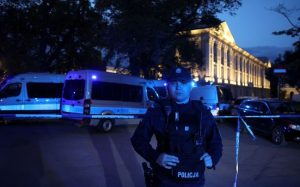UN: More than 5,600 people killed by gang violence in Haiti in 2024
3 min readIn 2024, Haiti experienced a devastating surge in gang violence, with over 5,600 people killed, according to a report by the United Nations Human Rights Office. This represents a more than 20% increase in killings compared to the previous year. The violence, fueled by heavily armed gangs, has crippled the country and continues to overwhelm the population, despite efforts by a U.N.-backed peacekeeping mission led by Kenya to restore order.
The surge in violence has had far-reaching consequences, with more than 2,200 people reported injured and almost 1,500 victims kidnapped, the U.N. reported. The Human Rights Office further documented 315 incidents of lynching, where gang members or suspected affiliates were executed by vigilante groups. Additionally, the U.N. recorded 281 cases of alleged extrajudicial killings involving police units that are meant to maintain law and order.
Volker Türk, the U.N. High Commissioner for Human Rights, condemned the violence in a statement, highlighting the dire human toll it is taking on Haitian citizens. He pointed to the ongoing issues of impunity for human rights violations, widespread corruption, and the failure of the justice system to address the violence.
Haiti’s security situation has deteriorated sharply in the years following the assassination of President Jovenel Moïse in 2021, which destabilized the government and allowed gangs to gain more control. They are now estimated to control about 85% of the capital, Port-au-Prince, including key infrastructure such as prisons, police stations, and even the main international airport. These gangs often launch coordinated attacks on these institutions, further destabilizing the country and preventing any meaningful efforts to restore order.
Despite the presence of international peacekeeping forces, the situation has worsened as the gangs, armed with sophisticated weaponry, continue to terrorize citizens. In response, the U.N. has ramped up its efforts to combat the violence, with Kenya leading the charge in a mission aimed at stabilizing the country. However, the Kenyan-led operation has struggled to make significant progress, as gang violence remains rampant and deeply ingrained in Haitian society.
Human rights groups have raised concerns over the role of the police in perpetuating violence. The U.N.’s report also highlighted numerous cases of alleged summary executions carried out by specialized police units, raising questions about the accountability of the forces tasked with upholding the law. These police actions contribute to the culture of impunity, making it difficult for ordinary Haitians to feel safe or trust the justice system.
The situation in Haiti is increasingly seen as a humanitarian crisis, with communities in dire need of protection and support. The U.N. has called on the Haitian government to take more decisive action to restore security, but the country’s political instability, compounded by economic hardship, makes it challenging to tackle the root causes of the violence. The continued growth of gang power and the inability of state institutions to respond effectively have left many Haitians feeling abandoned and vulnerable.
Efforts to address the violence through peacekeeping and international support have not yielded the desired results. The country’s security forces, deeply divided and lacking in resources, are overwhelmed by the scale of the gang threat. While the international community has pledged assistance, the ongoing violence and political instability suggest that more comprehensive and sustained efforts will be needed to address the underlying causes of the crisis.
In the meantime, the people of Haiti continue to bear the brunt of this unrelenting violence, with their lives and livelihoods hanging in the balance. As the country grapples with a complex web of social, political, and economic challenges, it is clear that a long-term solution will require more than just military intervention—it will demand a concerted effort to tackle corruption, build stronger institutions, and restore faith in the rule of law. Until then, the situation remains dire, with no end in sight for the suffering of the Haitian people.






